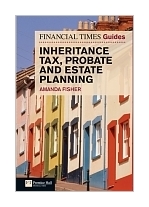|
||
• wydawnictwa polskie
• Zamów informacje o nowościach z wybranego tematu • kontakt
• Cookies na stronie |
FINANCIAL TIMES GUIDE TO INHERITANCE TAX PROBATE AND ESTATE PLANNINGFISHER A.wydawnictwo: PEARSON , rok wydania 2010, wydanie Icena netto: Financial Times Guide to Inheritance Tax , Probate and Estate PlanningNearly 9.5 million households in Britain will have to pay inheritance tax. What’s the best way to avoid it? If you’re administering an estate because someone has died, how do you obtain probate? Is it ever possible to retrospectively minimize an estate’s tax liabilities? The Financial Times Guide to Inheritance Tax, Probate and Estate Planning will help you navigate the complicated maze of inheritance tax, probate, and estate planning. Amanda Fisher tells you what to do when someone dies, helps you deal with administrative affairs and distribute the estate to beneficiaries, offers long-term strategies on how to protect your estate and minimize any potential inheritance tax liability, including the use of trusts. The Financial Times Guide to Inheritance Tax, Probate and Estate Planning: · Explains what to do when someone has died including how to register the death · Advises on the duties of executors and administrators and how to consider the validity of a will · Helps you apply for the grant of probate or letters of administration · Guides you through the completion of inheritance tax returns and how to calculate and pay any tax due · Provides advice on lifetime planning and illustrates ways to minimize potential inheritance tax liabilities The Financial Times Guide to Inheritance Tax, Probate and Estate Planning will help you face the difficult task of dealing with an estate when someone has died. You’ll learn the best way to manage the process of acquiring probate and complete the administration of the estate, before distributing to the beneficiaries. You will also have an insight to the advantages of make a will and organizing your estate efficiently to minimize any future impact of inheritance tax, including the use of trusts. The Financial Times Guide to Inheritance Tax, Probate and Estate Planning covers: Registering a death The duties of the executors and administrators Consideration of the validity of a will Intestacy and partial intestacy Obtaining details of assets and liabilities Applying for the grant of probate and the letters of administration How income and gains are treated before and after the date of death Valuing property for inheritance tax Calculating the inheritance tax liability and completing the inheritance tax return forms Consideration of tax planning and deeds of variation Paying the inheritance tax Distributing the estate to the beneficiaries Lifetime planning to reduce an inheritance tax liability The benefits of making a Will Trusts Glossary of key terms Table of Contents
Preface PART ONE THE APPLICATION FOR PROBATE 1 Registering a death 2 Other matters to address when someone has died 3 The duties of executors and administrators 4 Consideration of the validity of a will 5 Intestacy and partial intestacy 6 Obtaining details of assets and liabilities 7 The need for a grant 8 Applying for probate and letters of administration PART TWO INCOME TAX AND CAPITAL GAINS TAX 9 Treatment of income before and after the death 10 Tax liabilities and obligations to the date of death 11 Tax liabilities during the estate administration period PART THREE INHERITANCE TAX 12 Completing the inheritance tax return 13 How to value property for inheritance tax 14 Overseas property 15 Considering gifts made before death 16 Calculating inheritance tax liability on the death estate 17 Tax planning after death and deeds of variation 18 Excepted estates 19 Paying inheritance tax PART FOUR WHEN PROBATE HAS BEEN GRANTED 20 Distributing the estate 21 Estate accounts 22 Revisions and amendments to the estate PART FIVE LIFETIME PLANNING 23 Lifetime planning to reduce an inheritance tax liability 24 The benefits of making a will 25 Trusts
Appendix A Tax return SA900 relating to the estate administration period and form R185 Appendix B Inheritance tax return forms Appendix C Estate accounts Appendix D Further help Glossary Index 352 pages, Paperback
Po otrzymaniu zamówienia poinformujemy, |


